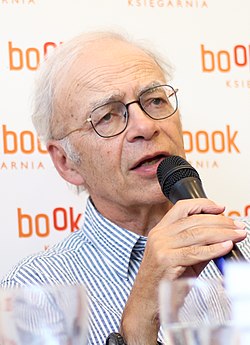Peter Singer Quote
As far as food is concerned, the great extravagance is not caviar or truffles, but beef, pork and poultry. Some 38 percent of the world's grain crop is now fed to animals, as well as large quantities of soybeans. There are three times as many domestic animals on this planet as there are human beings. The combined weight of the world's 1.28 billion cattle alone exceeds that of the human population. While we look darkly at the number of babies being born in poorer parts of the world, we ignore the over-population of farm animals, to which we ourselves contribute...[t]hat, however, is only part of the damage done by the animals we deliberately breed. The energy intensive factory farming methods of the industrialised nations are responsible for the consumption of huge amounts of fossil fuels. Chemical fertilizers, used to grow the feed crops for cattle in feedlots and pigs and chickens kept indoors in sheds, produce nitrous oxide, another greenhouse gas. Then there is the loss of forests. Everywhere, forest-dwellers, both human and non-human, can be pushed out. Since 1960, 25 percent of the forests of Central America have been cleared for cattle. Once cleared, the poor soils will support grazing for a few years; then the graziers must move on. Shrub takes over the abandoned pasture, but the forest does not return. When the forests are cleared so the cattle can graze, billions of tons of carbon dioxide are released into the atmosphere. Finally, the world's cattle are thought to produce about 20 percent of the methane released into the atmosphere, and methane traps twenty-five times as much heat from the sun as carbon dioxide. Factory farm manure also produces methane because, unlike manured dropped naturally in the fields, it dies not decompose in the presence of oxygen. All of this amounts to a compelling reason...for a plant based diet.
As far as food is concerned, the great extravagance is not caviar or truffles, but beef, pork and poultry. Some 38 percent of the world's grain crop is now fed to animals, as well as large quantities of soybeans. There are three times as many domestic animals on this planet as there are human beings. The combined weight of the world's 1.28 billion cattle alone exceeds that of the human population. While we look darkly at the number of babies being born in poorer parts of the world, we ignore the over-population of farm animals, to which we ourselves contribute...[t]hat, however, is only part of the damage done by the animals we deliberately breed. The energy intensive factory farming methods of the industrialised nations are responsible for the consumption of huge amounts of fossil fuels. Chemical fertilizers, used to grow the feed crops for cattle in feedlots and pigs and chickens kept indoors in sheds, produce nitrous oxide, another greenhouse gas. Then there is the loss of forests. Everywhere, forest-dwellers, both human and non-human, can be pushed out. Since 1960, 25 percent of the forests of Central America have been cleared for cattle. Once cleared, the poor soils will support grazing for a few years; then the graziers must move on. Shrub takes over the abandoned pasture, but the forest does not return. When the forests are cleared so the cattle can graze, billions of tons of carbon dioxide are released into the atmosphere. Finally, the world's cattle are thought to produce about 20 percent of the methane released into the atmosphere, and methane traps twenty-five times as much heat from the sun as carbon dioxide. Factory farm manure also produces methane because, unlike manured dropped naturally in the fields, it dies not decompose in the presence of oxygen. All of this amounts to a compelling reason...for a plant based diet.
Related Quotes
About Peter Singer
On two occasions, Singer served as chair of the philosophy department at Monash University, where he founded its Centre for Human Bioethics. In 1996, he stood unsuccessfully as a Greens candidate for the Australian Senate. In 2004, Singer was recognised as the Australian Humanist of the Year by the Council of Australian Humanist Societies. In 2005, The Sydney Morning Herald placed him among Australia's ten most influential public intellectuals. Singer is a cofounder of Animals Australia and the founder of the non-profit organization The Life You Can Save.
